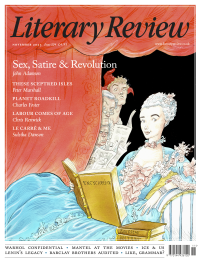Charlie Campbell
Robert Posner, 1950–2023
Robert Posner enriched many people’s lives with his charm, intelligence and kindness. He died of cancer on Monday 9 October in a remote cottage on Skye, where he’d moved in 2017. It was an odd place for a man as sociable as Robert to end up, perhaps, but he didn’t need much and made lifelong friends wherever he went. And he had his beloved daughter, Naomi, with him at the end.
Thirty-seven years ago, Robert walked into Literary Review’s office for what would be the first of a number of stints as its business manager. One of the staff had spotted a beautiful man reading the magazine in a nearby cafe and had drawn his attention to the job ad at the back. The editor, Auberon (‘Bron’) Waugh, hired Robert on the spot, so taken was he by his energy and warmth. Robert would be a semi-permanent fixture at the magazine for the next twenty-odd years. His position on the masthead would change regularly, from ‘boxwallah’ to whichever military rank Bron chose to bestow on him that month. Bron had a particular fondness for Robert (which was reciprocated) and seemed to fizz in his presence. But it was not just about charm. If you needed something done, Robert was your man. When I was burgled, Robert turned up hours later with a bag of tools and replaced my broken doorframe. He was what all small businesses need and did everything bar writing, commissioning and reviewing books himself. He also co-founded the Academy Club in Beak Street and ran it, enforcing the club’s only two rules (no poets, no sandals). It became one of Soho’s iconic drinking spots.
Robert was born in northwest London in 1950 and sent to boarding school at a very young age. A schoolmate remembers his buoyancy even then. Robert sat one particular exam in which he was unable to answer any of the questions and wrote instead that he knew ‘nothing about the Treaty of Ratisbon’ but did know ‘twenty-three ways to get from Golders Green to Paddington’ and proceeded to list them. The examiners failed him and themselves in not recognising a rare and original mind. After school, Robert spent a long period on a kibbutz in Israel before returning to London.
This isn’t even Robert’s first obituary. His school magazine ran one fifty-odd years ago after an incident in Switzerland. Robert hadn’t died, however. He was just serving a short term in prison there after a brush with the law. With his usual light touch, he described having a lovely time, catching up on reading and learning to restore antique furniture. Only Robert could have made Swiss jail sound like fun.
He made an extraordinary impact on those of us who were fortunate enough to work with him. He may have been brought in to deal with the business side of things, but he was bohemian and raffish and as creative as anyone. His handwriting was so exquisite that contributors often didn’t want to cash the cheques he sent them and his dress sense was almost as fabulous. A former colleague recalled to me his interview, during which Robert wore motorbike leathers and maybe even a crash helmet. These days we would call Robert a disruptor. His zest for life and humour transformed the working day, and many of us have never had quite so much fun in an office again. He lit up the world around him.

Sign Up to our newsletter
Receive free articles, highlights from the archive, news, details of prizes, and much more.@Lit_Review
Follow Literary Review on Twitter
Twitter Feed
Under its longest-serving editor, Graydon Carter, Vanity Fair was that rare thing – a New York society magazine that published serious journalism.
@PeterPeteryork looks at what Carter got right.
Peter York - Deluxe Editions
Peter York: Deluxe Editions - When the Going Was Good: An Editor’s Adventures During the Last Golden Age of Magazines by Graydon Carter
literaryreview.co.uk
Henry James returned to America in 1904 with three objectives: to see his brother William, to deliver a series of lectures on Balzac, and to gather material for a pair of books about modern America.
Peter Rose follows James out west.
Peter Rose - The Restless Analyst
Peter Rose: The Restless Analyst - Henry James Comes Home: Rediscovering America in the Gilded Age by Peter Brooks...
literaryreview.co.uk
Vladimir Putin served his apprenticeship in the KGB toward the end of the Cold War, a period during which Western societies were infiltrated by so-called 'illegals'.
Piers Brendon examines how the culture of Soviet spycraft shaped his thinking.
Piers Brendon - Tinker, Tailor, Sleeper, Troll
Piers Brendon: Tinker, Tailor, Sleeper, Troll - The Illegals: Russia’s Most Audacious Spies and the Plot to Infiltrate the West by Shaun Walker
literaryreview.co.uk